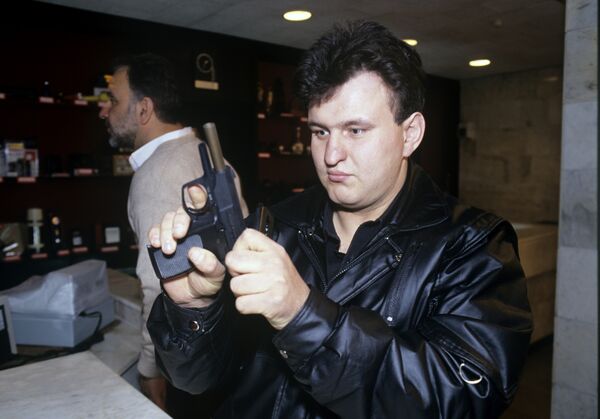It will be harder for Russians to obtain weapons following the passage in the State Duma yesterday of amendments to the Law on Arms, tightening regulations on the civilian possession of weapons, including non-lethal firearms. Cases involving the illegal use of such firearms have sparked a fierce debate in the media and in the country at large. Some want to completely outlaw the possession of weapons by members of the public, others want tougher licensing procedures, and still others think non-lethal weapons should be outlawed, while lethal weapons should be permitted. Duma deputies chose the second path.
Shooting lessons
Lawmakers did not disarm the public yesterday but rather made non-lethal firearms harder to acquire. First of all, they gave the term “non-lethal firearm” a legal definition. Popularly referred to as “gas pistols” in Russia, such non-lethal firearms fire rubber bullets. There are also guns without barrels that also fire rubber bullets. Now, these will be officially labeled “limited damage firearms,” and all the regulations covering lethal firearms will be extended to non-lethal ones.
The second and perhaps most important change to the law is that persons acquiring weapons for the first time will have to undergo special training, including hands-on practice. This, of course, places a burden on anyone wanting to own weapons, but mandatory training exists in many countries, and the results speak for themselves.
In the West, the International Practical Shooting Confederation (IPSC) and the International Defensive Pistol Association (IDPA) teach people how to shoot. It is not clear who will run these courses in Russia. The new amendments authorize duly licensed educational institutions to carry out this training (no such institutions exist yet) and organizations that train private security guards. However, the law will not come into force for another six months so the hope is that these schools will have appeared by then.
Reason vs. emotion
Lawmakers deserve credit for not giving in to emotion and taking up the cause of the alarmists who propose banning non-lethal firearms without giving the public anything in return. Any reasonable person should be able to grasp that the main problem are not the weapons themselves but rather the prevalence of violence in Russian society. Reports in the media about the improper use of non-lethal firearms and its consequences all add up to a tangled web of economic, social, ethnic and other problems. Trying to solve them by banning these firearms is akin to fighting pornography by banning computers, or trying to fight drug use by banning syringes.
“Banning non-lethal firearms isn't worth it,” argues Georgy Ter-Akopov, a partner at the law firm Knyazev & Partners. “The level of street crime in Russia is high, and people do not believe the police can always provide the protection they need.”
However stricter regulation of the sale and use of these weapons is indeed worthwhile. Raising the minimum age is an important step. Today, any 18 year-old can buy a gun, but at this age, Mr. Ter-Akopov believes, an individual still has the psychology and mentality of an adolescent. That’s why young people so often resort to the use of non-lethal firearms in resolving their conflicts.
But this is not the only reason.
Because these firearms are non-lethal, the psychological barrier against using them is much lower than for lethal weapons.
“Many see non-lethal firearms as their weapon of choice in a fight, as an extension of their fist, something they can use without fear of retaliation,” said Boris Pashchenko, the head of the Taktika gun club. People are much more careful around lethal weapons.
Judge for yourself – today Russians possess about six million legal firearms, and the percentage of infractions involving legally owned weapons is negligible. The proposal put forward by Alexander Torshin, first vice-speaker of the Federation Council, to ban non-lethal weapons while “restoring the right to possess lethal handguns” doesn’t seem so far-fetched after all.
Legal cases
Lawyers believe that teaching people the proper way to handle a weapon is not enough. Rather, what Russians need is a campaign to educate people about the laws regarding the use of weapons.
“The line between self-defense and offense is very thin,” explains Mr. Ter-Akopov. “Often people simply do not understand the difference. Defense is limited to actions taken to prevent criminal attacks on one’s life, property and health.” But this is not as clear as it sounds. “Weapons can be used after you have already been attacked, but will people who find themselves in this situation still be in a condition to hit back in defense?” asked Dmitry Gurov of Gurov, Gaidai and Partners.
In ninety percent of cases involving the use of weapons in self-defense, judges rule that it was, at the very least, “disorderly conduct involving the use of weapons.” Mr. Gurov said that proving the opposite is very difficult.
What’s more, people are not always inclined to resolve self-defense cases through the proper legal channels.
“Some clients start by asking who needs to be bribed and how much, so the case can be settled,” complains Dmitry Gurov. “It’s hard to explain to them that this is not what lawyers do.”
Obviously, the issue of civilian weapons cannot be resolved until radical changes are made in how self-defense is treated in the criminal justice system. Perhaps we should consider adopting the uniquely American concept of the castle doctrine, in other words, “my home is my castle.” What this boils down to is “the right not to run.” The castle doctrine holds that any lawful means can be used to repel forcible entry into one’s home while the “right not to run” means that victims can use force even if they have the opportunity to save themselves by fleeing.
The views expressed in this article are the author’s and do not necessarily represent those of RIA Novosti.



